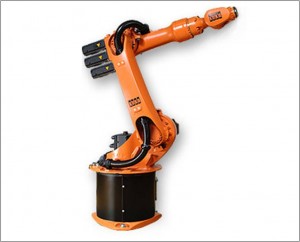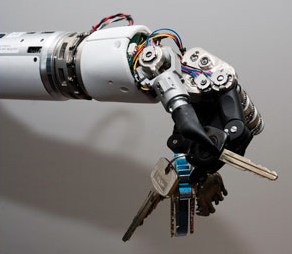or Mechatronic Engineering, humourously (but incorrectly) referred to as Megatronics at times. In Afrikaans Megatronika or Megatroniese Ingenieurswese. What is it? What can you do with it? When I started studying I didn’t know, after 5 years I think I have a vague idea. So below I’m going to post what I know.
In it’s simplest form it’s a combination of Mechanical and Electronic Engineering. If I really don’t feel like explaining, I simplify it to robotics. This is certainly a large portion of Mechatronics, but by no means a limiting factor.
Mechatronics as a named profession is fairly new, but the idea has always been there. In the South African context, UCT have had an accredited BSc (Eng) Mechatronics course since 1997 (although how long it has actually been running is uncertain), NMMU a BEng since 2007 (first graduates) and Stellenbosch since 2005 [1]. Potchefstroom University (NWU) are apparently aiming to start a course in the next few years [2]. Although not offered in the BEng format, UKZN do offer Masters through their Mechatronics and Robotic Research Group [3]. [EDIT: added list of BTech degrees and Diplomas offered at the bottom of the post]
Mechatronics at Stellenbosch [2]
I completed my BEng Mechatronics at Stellenbosch University in 2011. The Mechatronics course was presented by the Department of Mechanical and Mechatronic Engineering in a four year course. The first two years were identical to that of those studying towards a BEng Mechanical. The first year course is identical for all engineering students. In the third and fourth years, the two courses still followed similar routes, with the Mechatronics course replacing several Mechanical courses with some courses presented by the Department of Electronic and Electrical Engineering. In third year these included Electronics and Computer System’s courses and fourth year Electronics and Electronic Design Courses. Losing out on some Strength of Materials and Thermo-Fluid Mechanics.
The department put it this way [6]
The most important difference between the mechanical engineering programme and the mechatronic programme is that mechanical engineers are equipped to develop mechatronic systems with existing controllers (computers, PLC’s, etc.), while mechatronic engineers are also equipped to develop specialised controllers (e.g. for embedded controllers) and the relevant electronics themselves.
At the time, the Head of Department felt that Mechatronics as an entity was still too new. Employers weren’t advertising for Mechatronic Engineers, and didn’t really know what to do with them when they did get them. This resulted in the close ties between the Mechanical and Mechatronic courses. I was often unhappy about this, having would of preferred more focus on the Electronics, but in the end it worked out. And the HoD’s opinions were/are valid.
When I chose Mechatronics, I didn’t know where I was going to work, I chose the course because it sounded interesting. It wasn’t until my final year that I found a direction to work towards. Course setups at different universities are going to be different, and will put emphasis on different subjects, that doesn’t necessarily make one better than the other. Either way you’re going to come out of it with a degree and a fair amount of knowledge. Most importantly though (and this is true for any engineering degree) is you’ll know how to learn.
I’m quite confident that specific things that I learn in my first year of work will be of more value to my career than a specific subject at varsity, but having struggled through several subjects, I know I can figure out most things that come my way. I know where to look and how to go about solving problems.
In my final year we were a class of 85 Mechanical/Mechatronic students, of which I’d say about 30-35 received their BEng Mechatronics in 2011.
Mechatronics at NMMU [2]
NMMU have a slightly different setup. Mechatronics is presented by the Mechatronics school of the Department of Engineering, the Built Environment and IT. Mechatronics is the only Engineering degree they offer. As such, first year physics and maths are taken alongside BSc students and after the first year, courses taken are aimed only at Mechatronics students. The format of the course is still identical to that of when it started giving a good balance of subjects. The University also offers an array of BTech degrees in other Engineering fields.
I’m currently pursuing my master’s degree at NMMU. Their 4th year BEng Mechatronics class has roughly 25 students in it and the 3rd year class about 30. First year applications are limited to 60, with the most recent 1st year class starting with 50 students. The Mechatronics department is currently sponsored by General Motors South Africa (who have a plant in PE) and also have close ties to the Volkswagen plant in Uitenhage.
Mechatronics in General
Mechatronics as a career is still finding its feet. Meaning many consider it a jack of all trades, master of none type of situation, and although the course may feel that way, it’s certainly not the end of the story.
Mechatronics isn’t a new field, it’s just finally been given a name. When you tell people you’re a Mechatronic Engineer they don’t know what that is. I had a month stint at a large production facility as part of vacation training and I was asked to choose between focusing on their Mechanical or Electrical divisions, eventually settling for a bit of time at each. But that’s how businesses in SA are structured. This will change.
Several Mechatronic Engineers that I know have taken up Automation maintenance posts. Nothing wrong with this, personally it’s not where I want to be. Contrary to this though, my first job next year will be in automation maintenance. I however plan to use this as a stepping stone into a design career.
Automation is fun, and whereas I am going into automation in a production sense, automation also relates to smaller and/or more technical situations. The recent landing of the Curiosity rover on Mars is a perfect example of Mechatronic systems. There are several elements here, from the automated landing system to the remote control of the device.
In the motor industry, systems such as traction control, ABS and ESP are all examples of Mechatronic systems. Heavily complicated systems that rely on the processing of data from sensors to enable control of actuators. As such a Mechatronic Engineer can make him/herself home in many different industries. These include the Automotive, Aerospace, Manufacturing, Medical and Communications Industries.
Mechatronic Engineers can register with ECSA to become Professional Engineers [4]. The industry is governed by the South African Institute for Mechanical Engineers. I don’t see Mechatronics separating from this tree any time soon. The degree, being accredited by ECSA also means that the degree will be recognised internationally in many countries thanks to the Washington, Sydney and Dublin Accords [5]
So what do you do when you have your degree? You do whatever you want. You’ll find something. I’m not aware of any of my colleagues who are currently not pursuing a post-graduate degree or are employed. Not all of them are in Mechatronic specific posts. Some have opted for more mechanical orientated jobs, while others have gone entirely into areas such as electronic design or programming. And that’s one thing, a degree in Mechatronic Engineering in no way limits you. Very few engineering degrees will actually.
After re-reading what I’ve written, I think I’ve put forward some information relating to Mechatronic Engineering, but it’s still left fairly vague, maybe it’s just because none of us know what we’re really doing :)
A National Diploma in Mechatronics (for registration as a Professional Engineering Technician) can also be had from the following institutions [7]:
- Tshwane University of Technology
- UNISA
- Cape Peninsula University of Technology
A BTech in Mechatronics (for registration as a Professional Engineering Technologist) from [8]:
- Tshwane University of Technology
- UNISA
- Cape Peninsula University of Technology
and to reiterate, a BEng, or BScEng (for registration as a Professional Engineer) [1]:
- Stellenbosch University
- University of Cape Town
- Nelson Mandela Metropolitan University
Note: Although other institutions may offer courses in Mechatronics, or Mechanical Engineering with a focus on Mechatronic elements, the ones listed above are the only ones recognised by ECSA for registration as a mechatronic professional. Information was correct at time of posting, but may have changed since.
There are also several Universities of Technology and FET Colleges which offer courses in Mechatronics. CPUT is one of these institutions. Another training institution is Umbilo Training Specialists in Durban. They are running a free training course, once a month where anyone can come to learn more and expand their knowledge. Checkout their page for details.
For some more reading and a very complimentary view with some poignant remarks have a read here.
As part of my degree at Stellenbosch University I completed a project which can be seen here.
As part of my master’s degree at NMMU I completed a project which can be seen here and here.
If you’re looking for bursaries, try this website.
If you have any questions, feel free to ask in the comments section.
- [1] ECSA – Accredited Universities
- [2] Much of what is stated comes from my own experiences and conversations with relevant people.
- [3] UKZN – Mechatronics and Robotics
- [4] ECSA – Registration
- [5] ECSA – Recognised Qualifications
- [6] Stellenbosch University – Mechatronic Engineering
- [7] ECSA – Accredited Diplomas
- [8] ECSA – Accredited BTech





Hi Gareth
Thank you so much for your post, it was really helpful!
Is there any difference between a Bsc(Eng) Mechatronics and a BEng Mechatronics?
Sincerely,
Khensani
Hi Khensani, glad to help.
In practice there is no real difference between a Bsc(Eng) and a BEng.
what are the minimum requirements for studying mechatronics?
Requirements vary between institutions and each year. You should check with particular institutions the minimum requirements for the year you want to apply.
Hi Gareth
Your personal experience and advice on direction will be appreciated – an applicant has been accepted for electronic engineering – US ( mechatronic is full) and he has been accepted for mechatronics at NMU. He is uncertain re the institution – you have studied st both – which one? tia
Hi Suyenne,
I’ll send you an email directly with my response in the next day or two.
Gareth
hi Gareth
I too was accepted at NMU for mechatronics. can you please forward me the email
thanks
Hey, what specific information are you interested in.
I would like information with regards to how good is the degree at NMU with regards to content and employability. Eg. would an employer specifically favour a UCT applicant over one from NMU? Are NMU students on par with other universities?
Have replied to you via email.
Hi Gareth
I have been recently accepted to study mechatronics at NMU, I wanted to ask if it’s a good institution in terms of employability in this field?
Hi Sipho, with how few universities there are in SA that offer Mechatronics, having the degree will convey more than where you got it.
Some employers may be bias towards where they went to school, but in general how well you do and the projects you work on will be more important.
NMU also has a lot of collaboration with industry in the area, so there should be opportunities for you to make connections.
Hey Gareth
I need your advise on this
I did electronic engineering ( national diploma), so is it possible to change to mechatronics.
Hi Joseph,
What do you mean by change? Have you finished your diploma? Are you wanting to study further? Depending on your experience, you can potentially perform the responsibilities required of a mechatronic engineer.
Hi Gareth
Thank you for a most helpful post!
My son wants to study Mechatronics. We live in Pretoria. Is TUT the only tertiary centre that offers mechatronics? Or do you maybe know of a private University offering this course?
TUT is the only school in the area that I know of that offers a Mechatronics specific course.
Someone should make an easy list of suppliers for us students, buying from amazon and ebay is a killer.
im on the hunt for local suppliers (arduino, kits, robotic parts etc). so far ive found PClinkshop.co.za, Microbotsa.co.za, and other supplies on BOB.
I can definitely sympathise. Micro Robotics can also be a good source, and I’ve regularly placed orders through RS Components as well.
Just want to mention that Leobot Electronics is in Port Elizabeth too!
https://leobot.net
Hi Gareth
I just want to ask im a first year student at Unisa doing ND mechatronic engineering would like to know if is it rated like any other ND from varsities offering the same course
Hi Kabelo, are you asking how it rates compared to NDs at other universities?
Hi Gareth what I mean is in terms of employment will my ND be less considered as compared to ND from other institutions offering the same course
Thanks
Hi Kabelo, I don’t know specifically, but the ND is a regulated course, so completing it any accredited institution implies you’ve met the same requirements. Additionally, the inclusion of a required practical/internship makes the diplomas even less dependent on the school that you got it at.
Thanks so much Gareth
Hi Gareth. I’m a third year mechatronics engineering student at UCT. I was wondering if you could help me get vac work for this mid year vacation?
Kind regards
Kegomoditswe
Hi Kegomoditswe
I can’t really help directly, don’t know people with suitable businesses, but have sent you an email with one or two companies you can try contact.
Hi there
My son would like to study Mechatronics. Mind to share your experience with him.
Hi Kaine, have sent you an email
Hi Gareth,
Great blog, I feel your opinion was well articulated. I am hoping you are able to give me some advice. I graduated from Stellenbosch University as a civil engineer in 2019. I have been working for 4 months now and I have realized that my passion is not with this discipline of engineering. I am currently based in PE, so naturally I am thinking of doing the course here. Do you perhaps know of someone ( I read you are currently busy with your masters) in the faculty I could talk to directly. I want to know how many credits I can carry over etc.
Thank you
Kind Regards
Andre Stemmett
Sorry to ask another question but do you know if B.ENG Mechatronics from NMMU falls under the washington accord.
The Mechatronics BEng degree offered by NMMU is accredited by ECSA, and as such will fall under the Washington Accord.
Hey Andre,
Sorry to hear you’re not enjoying your current line of work. Are you sure it’s discipline itself, and not just the specific industry you’re currently working in?
As for NMMU, this post was written in 2012, so it’s been a while since I was there :)
That being said, I’d contact someone with in the department to find out what courses you’d still have to do and whether it’s an option: https://mechatronics.mandela.ac.za/
As an alternative to getting your bachelors in Mechatronics, if you feel you have some skills in Mechatronics, you could consider doing an MEng. You could probably do it in the same time, and depending on the specific project, your interests, and your skills, you could do a MEng in Mechatronics, even if you have a BEng in Civil.
All the best.
Hi Gareth
I hope this communique finds you well. Thank you for your information it’s really helpful.
I’m currently doing my in service training and completing my ND in Mechatronics engineering at TUT and the Btech is phased out so I don’t know where to go next coz I want to further my studies but I won’t be able to do that part time. So my options are to either start a Beng Tech with TUT from scratch and have one year credited or enrol with either UCT or NMMU to do my Beng there, I’ve always wanted to do my degree with a traditional university and looking at you blog, if I go with a traditional university I’ll be registered as an Engineer with ECSA wherein I’ll be registered as a technologist if I go with TUT. The reason I went to TUT is because I stay in Pretoria so it was a an advantage. With all of this said, I’d really appreciate your advice as to what to do, which option you think I should go with. And if I’ll get credits if I with a traditional university.
Kind regards
Khethu
Hey Khethu,
It really depends what you want to achieve? What kind of stuff do you want to do? Is there a specific industry or job type that specifically appeals to you? It’s hard to give advice not really knowing you :)
What kind of work are you doing for your in service training? Are you enjoying it? It’s always great to have the opportunity to study further, but before pursuing a specific course, think about whether it’ll get you closer to a specific job or outcome that you desire.
You should definitely be able to get into a BEng or BTech Mechatronics course having completed your ND. It’s difficult to say whether you’ll get credits (ie. not have to take specific courses), as it can vary quite a bit by institution.
All the best!
Gareth
Hi Gareth,
Thanks for the information, coming from a mother of a 15 year old, who knows nothing about it. My son is interested in Mechatronics as a career. He has been tasked by his school to spend a day with a Mechatronic Engineer during the July school holidays. This all to do with the upcoming subject choices for grade 9s. We are based in Pta. Any ideas of where/who we can ask?
Hi Vera,
I’m glad the information was useful. Unfortunately I don’t know of specific companies/contacts for the PTA area.
BMW (link) and Nissan (link) both have plants in Rosslyn. You can try contacting someone in their HR departments to see if they offer job shadowing. They may not have people with the title Mechatronic engineer, but have many related and interesting positions, particularly in the BodyShop and maintenance departments. Alternatively Mechatronics SA, an automation company has offices just south of Pretoria (link).
Good luck
Thanks so much Gareth, we appreciate the information given and will try.
Vera